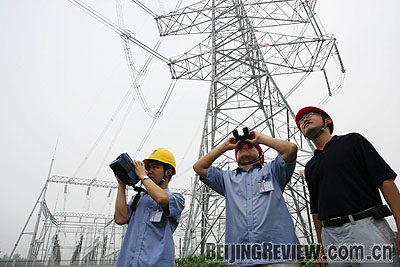| Numbers of the Week
3.7 percent
China's power consumption in October was 269.85 billion kwh, down 3.7 percent compared with October 2007, the first year-on-year monthly decrease since 1999 amid an economic slowdown, according to the China Electricity Council.
100 million yuan
Youku.com, a Chinese YouTube-style website, plans to generate 100 million yuan ($14.6 million) of revenue by providing about 40,000 television programs online with built-in advertisements. Its deal with more than 1,000 television content providers will let viewers watch 80 percent of Chinese television programs online.

TO THE POINT: China continued buying U.S. treasury bonds in September and overtook Japan as the largest holder of U.S. government debt. Bank of America plans to increase its stake in China Construction Bank amid a bright outlook for China's banking industry. The prolonged takeover talks to rescue engulfed baby formula maker Sanlu are yielding fresh results as the company's seven affiliated plants were sold to Beijing-based Sanyuan Group.
By HU YUE
Snapping Up U.S. Treasury Bonds
China has finally displaced Japan as the largest foreign holder of U.S. treasury bonds. Data from the U.S. Treasury Department indicates that China's holdings of U.S. government debt had risen to $585 billion by the end of September from $541.4 billion in August. By contrast, Japan's holdings shrank to $573.2 billion from $586 billion.
China started purchasing more U.S. government debt in July, when news about the subprime mortgage crisis began grabbing headlines. But buying more U.S. debt was not an easy decision for China. There was growing concern that the United States would put up more bonds for sale to finance its unprecedented government bailout plan, thus reducing the value of China's existing holdings. Moreover, the value of the U.S. dollar is expected to fall considerably in the long term because of simmering recessionary fears, taking some shine off dollar-denominated assets.
So far, U.S. bonds have not lost their appeal as expected, but have remained a favorite investment for those seeking a safe refuge as global stocks continue to tumble.
"Amid the financial market turmoil, the U.S. bonds have become hot vehicles for investment," said Zhang Ming, a researcher at the Chinese Academy of Social Sciences (CASS) in a report. "Investors want safety when risks emerge, and there's nothing safer than U.S. bonds."
Besides this, strong foreign demand for the bonds has sparked a heavy capital flow into the United States, triggering a rally of the U.S. dollar in recent days. Analysts say this is another major reason why China joined the buying rush for U.S. government debt.
"In addition, snapping up the treasury bonds will help cover the U.S. fiscal deficit and fund its financial bailout plans," said Yi Xianrong, an economist at the CASS, in a statement. "After all, it's in China's interest to help stabilize the U.S. financial system."
"Moreover, there's no safer place than the U.S. bonds for China to park its huge amounts of foreign reserves in such a risk-ridden world economy," Yi said. "The country's losses from the financial contagion would have been much higher were it not for a risk-averse investment strategy."
Banking Interests
Bank of America (BOA) announced on November 17 that it was increasing its stake in China Construction Bank Corp. (CCB) to 19.13 percent from the current 10.75 percent in a deal worth about $7 billion.
BOA is expected to exercise an option to buy the Hong Kong-listed shares of CCB from the Central Huijin Investment Corp. by the end of this month at a price of around HK$2.8 per share, a nearly 32-percent discount to CCB's closing price in Hong Kong on November 17.
BOA paid $3 billion for a 9-percent interest in CCB in June 2005 and invested another $1.9-billion in July 2005. The lockup period for its holdings obtained in 2005 expired this October.
Analysts interpret the new stake increase as a sign of BOA's strong confidence in the country's healthy banking industry. It also could bring a measure of calm to worries that BOA, suffering heavy losses at home due to the near-stagnation of the U.S. credit markets, might sell part of its original holdings in CCB to patch up its leaky balance sheet, they said.
But market concerns may still linger that BOA could eventually pare down its holdings given the juicy returns it could get from the arbitrage play, according to a Goldman Sachs Group Inc. report. Despite the recent drop in CCB's share price, BOA's total $4.9-billion investment was worth $14.5 billion as of September 30, almost triple the original value.
| 